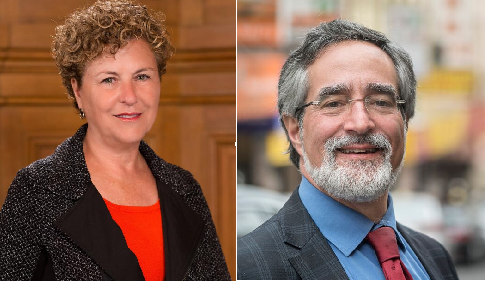Will the party side with the mayor and the tech industry — or can Peskin and the Airbnb measure round up the votes?

By Tim Redmond
AUGUST 10, 2015 – The San Francisco Democratic Party will vote Wednesday night on its endorsements for the November election, and the outcome will be significant not only because of the impact the DCCC slate can have but because it will be another key signal of how directly the mayor and the real-estate and tech interests control the local party.
There are several key ballot measures that will be a referendum on Mayor Ed Lee’s policies – and the District 3 supervisorial race will be a critical decision that will determine future control of the Board of Supervisors.
The DCCC matters in part because in this heavily Democratic city, a slate mailer that offers the official recommendations of the party carries weight. In an election like this one, it also offers the wealthy allies of the mayor a way to pour unlimited cash into campaigns: If the party, for example, endorses Sup. Julie Christensen, Lee’s tech oligarchs can contribute vast amounts of money to the Party, which can use that money to print and mail Party literature.
At this point, as far as I can tell, the D3 race is very, very close. Both sides are working the phones madly, and the fact that Peskin is within range of winning is a remarkable testament to his political skills.
“This will be a close vote on what is a very disappointing committee,” member Rafael Mandelman, who is also president of the Community College Board, told me.
Now: If this were really about “Democratic Party” politics, Peskin would have a huge advantage. He’s not only a former member of the DCCC, but he’s a former chair, and as member Alix Rosenthal told me, “I have to respect all the work that he has done for the Party.”
If you go to the Federal Elections Commission website, and type in “Aaron Peskin” and “Julie Christensen” you will find that Peskin has, over the years, contributed thousands of dollars to Democratic candidates at the Congressional and national level. The only Julie Christensen who has given any money is a woman in Folsom who works for a drug company.
But of course, we all know that, for all the pious talk the members put out about supporting “active Democrats,” it’s really power politics, and the stakes are so high that every possible swing vote is under immense pressure.
And at this point, most are on one side or another. Rosenthal is among the very few who are not committed – and that makes her a critical swing vote.
“I haven’t made up my mind,” she told me. “Aaron and I have a long relationship, and we’ve had some disagreements, and I think Julie is a good person, and I’ve always been about getting women elected to office.”
There are actually three choices: The panel could go with Peskin, with Christensen, or with “no endorsement.” Or members can abstain, which – frankly – is pretty weak: We elect these people to make decisions. Ducking is ducking, whatever you call it.
To make the plot even thicker, Rosenthal has interviewed for a job at Airbnb – and one of the biggest investors in that company, Ron Conway, is a big supporter of Christensen. Peskin has been a part of the campaign to more tightly regulate short-term rentals.
Rosenthal told me that nobody at Airbnb has put any pressure on her. “I brought it up myself, and they said my DCCC votes wouldn’t matter,” she said. “I don’t think Ron Conway pays that close attention to the details of who Airbnb hires.”
The rules governing conflicts of interest at the DCCC are so weak that nobody ever has to recuse himself or herself for anything. Tom Hsieh Jr., who is working on the campaign against the Airbnb initiative, can vote on that issue. Mary Jung, the chair, is the chief lobbyist for the SF Board of Realtors; she still votes on tenant issues.
Every statewide or national elected official who lives in San Francisco is automatically a member of the DCCC (and although they don’t go, they can appoint a proxy), so the final outcome might come down to the likes of Sen. Dianne Feinstein and Rep. Nancy Pelosi, neither of who at this point has endorsed a candidate. State Sen. Mark Leno and Assemblymember Phil Ting are with Peskin. We don’t know where Assemblymember David Chiu, who won his first election for supervisor with the strong support of Peskin, will go; the two have long since parted ways over issues.
Then there’s the Mission Moratorium and Airbnb.
Airbnb has created some unlikely alliances; the Apartment Association has joined with the Tenants Union to promote the ballot measure that will more strictly regulate short-term rentals. Feinstein is almost certainly on board with that measure. Chiu, of course, wrote the bill that the measure would largely overturn.
Again: It will be close.
And there’s a fascinating twist here: If the DCCC were to endorse Christensen, and then vote in favor of regulating Airbnb or in favor of the Mission Moratorium, the big money would stay out of the Party slate card: Ron Conway isn’t going to spend money on a card that endorses his candidate for D3 – but then seeks to impose regulations that will have a huge financial impact on Airbnb.
On the flip, if the DCCC endorses Peskin and then opposes the short-term rentals measure, the money stays out.
I suspect that we will see the Mission Moratorium vote break more closely to the vote on Peskin – although I can’t see Feinstein or Pelosi voting for that one.
So a huge and fascinating vote that will tell us: Does the local Party really represent the values of the traditional Democratic Party? Or has it, as my friend Joe Fitzgerald Rodriguez says, become more or less Republican?





